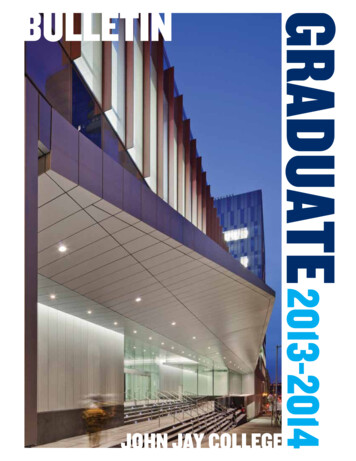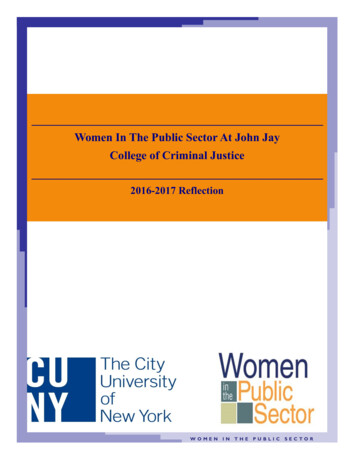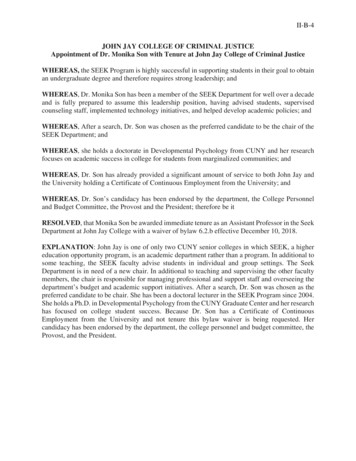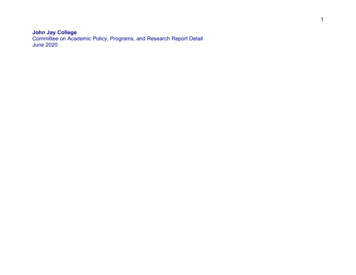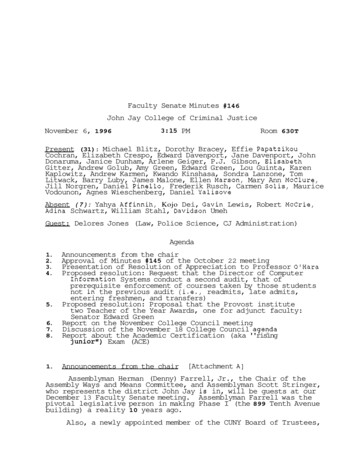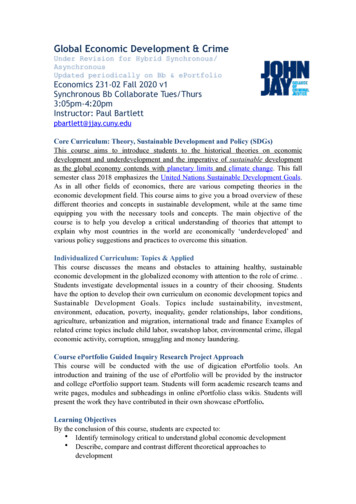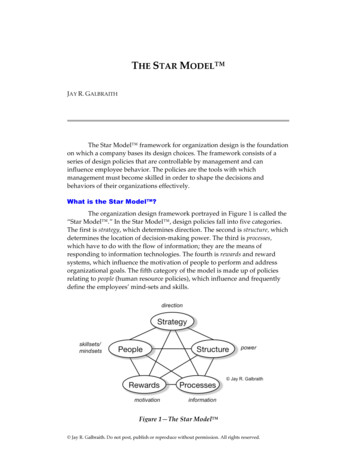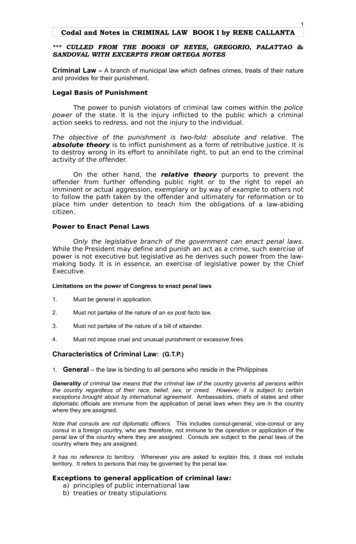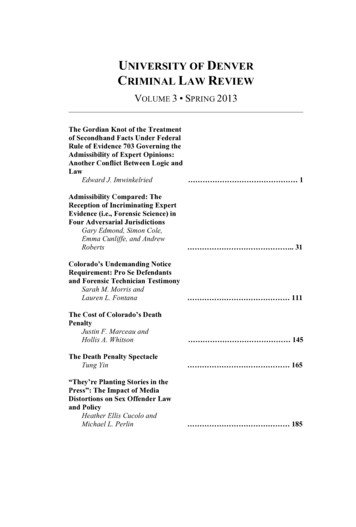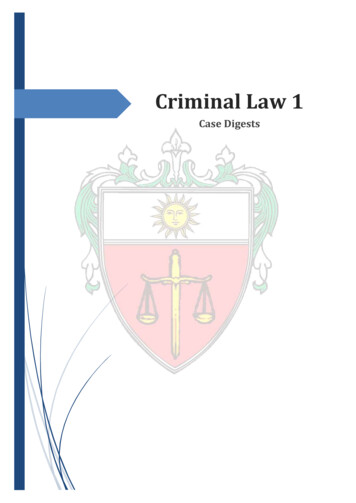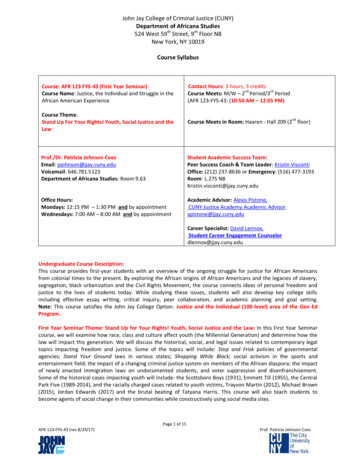
Transcription
John Jay College of Criminal Justice (CUNY)Department of Africana Studies524 West 59th Street, 9th Floor NBNew York, NY 10019Course SyllabusCourse: AFR 123 FYS-43 (First Year Seminar)Course Name: Justice, the Individual and Struggle in theAfrican American ExperienceContact Hours: 3 hours, 3 creditsndrdCourse Meets: M/W – 2 Period/3 Period(AFR 123-FYS-43: (10:50 AM – 12:05 PM)Course Theme:Stand Up For Your Rights! Youth, Social Justice and theLawCourse Meets in Room: Haaren - Hall 209 (2 floor)ndProf./Dr. Patricia Johnson CoxxEmail: pjohnson@jjay.cuny.eduVoicemail: 646.781.5123Department of Africana Studies: Room 9.63Student Academic Success Team:Peer Success Coach & Team Leader: Kristin ViscontiOffice: (212) 237-8636 or Emergency: (516) 477-3193Room: L.275 NBKristin.visconti@jjay.cuny.eduOffice Hours:Mondays: 12:15 PM – 1:30 PM and by appointmentWednesdays: 7:00 AM – 8:00 AM and by appointmentAcademic Advisor: Alexis Pistone,CUNY Justice Academy Academic Advisorapistone@jjay.cuny.eduCareer Specialist: David Lennox,Student Career Engagement Counselordlennox@jjay.cuny.eduUndergraduate Course Description:This course provides first-year students with an overview of the ongoing struggle for justice for African Americansfrom colonial times to the present. By exploring the African origins of African Americans and the legacies of slavery,segregation, black urbanization and the Civil Rights Movement, the course connects ideas of personal freedom andjustice to the lives of students today. While studying these issues, students will also develop key college skillsincluding effective essay writing, critical inquiry, peer collaboration, and academic planning and goal setting.Note: This course satisfies the John Jay College Option: Justice and the Individual (100-level) area of the Gen EdProgram.First Year Seminar Theme: Stand Up for Your Rights! Youth, Social Justice and the Law: In this First Year Seminarcourse, we will examine how race, class and culture affect youth (the Millennial Generation) and determine how thelaw will impact this generation. We will discuss the historical, social, and legal issues related to contemporary legaltopics impacting freedom and justice. Some of the topics will include: Stop and Frisk policies of governmentalagencies; Stand Your Ground laws in various states; Shopping While Black; social activism in the sports andentertainment field; the impact of a changing criminal justice system on members of the African diaspora; the impactof newly enacted immigration laws on undocumented students, and voter suppression and disenfranchisement.Some of the historical cases impacting youth will include: the Scottsboro Boys (1931), Emmett Till (1955), the CentralPark Five (1989-2014), and the racially charged cases related to youth victims, Trayvon Martin (2012), Michael Brown(2015), Jordan Edwards (2017) and the brutal beating of Tatyana Harris. This course will also teach students tobecome agents of social change in their communities while constructively using social media sites.Page 1 of 15AFR 123-FYS-43 (rev.8/29/17)Prof. Patricia Johnson Coxx
John Jay College of Criminal Justice (CUNY)Department of Africana Studies524 West 59th Street, 9th Floor NBNew York, NY 10019Course SyllabusRequired Texts and Materials:Franklin, S. M. (2014). After the Rebellion: Black Youth, Social Movement Activism, and the Post-Civil RightsGeneration. New York: NYU Press, 2014. Project MUSE. Retrieved from https://muse.jhu.edu/book/24438Students will be required to critically read, analyze and summarize the Selected Readings from chapters in After theRebellion, as well as other books, journal articles, periodicals, and on social media. Readings will be (distributed inclass, posted on Blackboard, or sent to your email on record) related to the ongoing struggle for justice for AfricanAmericans from colonial times to the present. Additionally, selected readings may be added based on current events,guest lectures and other related activities impacting the ongoing struggle of Africana communities.Justice Core FYS Learning Outcomes: At the end of the semester, based on critical reading, classroom participation,completion of written assignments, collaboration in group presentations and attendance at educational forums,students will be equipped with the tools, skills and knowledge to demonstrate the following skill sets: Describe and compare their own relationship to significant issues of justice, in particular, relationshipsimpacting the Africana community;Identify problems and propose solutions through evidence-based inquiry;Assess the effectiveness of their collaborative role with people of diverse backgrounds;Demonstrate effective planning and reflection to accomplish specific course outcomes; andEngage in co-curricular activities (e.g., student clubs, student activities, lectures, tutoring, academicadvisement, and community service) that support their academic goals and personal growth.Students will successfully achieve the learning outcomes by: Critically reading, comprehending and comparing the selected readings and distinguishing primary andsecondary sources;Gathering, interpreting and assessing the key terms, theoretical concepts and legal definitions related tojustice, the individual and struggle in the African American experience;Identifying, evaluating and clearly articulating in-class and in group presentations, the key historical andsocioeconomic facts, principles, and core concepts related to justice, the individual and struggles in theAfrican American experience;Developing a clear, concise and defined thesis statement, constructing well-supported and effectivearguments, and making viable group presentations by developing a group poster presentations, usingmultimedia sources and/or engaging in a performance presentation;Displaying the ability to conduct research, critically evaluate information, prepare a summary of your writtenconclusions and properly citing your sources of information in APA Style (as well as Bluebook citationformat); andActively participating in educational forums, applying your knowledge, and communicating effectively withparticipants at the forum.Page 2 of 15AFR 123-FYS-43 (rev.8/29/17)Prof. Patricia Johnson Coxx
John Jay College of Criminal Justice (CUNY)Department of Africana Studies524 West 59th Street, 9th Floor NBNew York, NY 10019Course SyllabusCivil Rights News Organizations and nonpartisan news organization and fact tank:The Marshall Project . The Marshall Project is a nonpartisan, nonprofit news organization that seeks to create andsustain a sense of national urgency about the U.S. criminal justice and issues impacting communities of color.Students are required to subscribe to The Marshall Project’s free newsletter vil Rights Sources:Martin Connor, M. (January 20, 2014). Editorial. A Dream Deferred: 10 Civil Rights Movement Reference in Rap. HipHop DMX. Retrieved from rap#NAACP Legal Defense Fund. Founded in 1940 under the leadership of Thurgood Marshall, who subsequently becamethe first African-American U.S. Supreme Court Justice, LDF was launched at a time when the nation’s aspirations forequality and due process of law were stifled by widespread state-sponsored racial inequality. From that era to thepresent, LDF’s mission has always been transformative: to achieve racial justice, equality, and an inclusive society.The Southern Poverty Law Center - Children's Rights Division. The SPLC is dedicated to fighting hate and bigotry andworks to seek justice for the most vulnerable members of our society.Pew Research Center (PRC) Social and Demographic Trends. The PRC is a nonpartisan fact tank that informs the publicabout the issues, attitudes and trends shaping America and the world. It conducts public opinion polling, demographicresearch, media content analysis and other empirical social science research.LLOYD SEALY LIBRARY RESOURCES: Students should obtain a library bar code and use the library’s resources. John Jay College’s library isthe Lloyd Sealy Library. The Library’s website contains Criminal Justice databases and relevant sourcesin the Race and Justice Clearinghouse containing selected NGO Reports books and journal articlesfocusing on race, ethnicity and the criminal justice system.John Jay College, Africana Studies ricana-studiesCable Satellite Public Affairs Network (C-Span), an American cable and public service satellite networkcreated by the American Cable Television Industry.New York Slavery Records Index. Records of Enslaved Persons and Slave Holders in New York 1623-1848(password, Freedom).Glossary of Library TermsRESEARCH WEEK TEXT (On reserve in the Library):McDougal, S. (2013). Research methods in Africana studies. New York: Peter Lang. ISBN-13: 978-1433124600.Page 3 of 15AFR 123-FYS-43 (rev.8/29/17)Prof. Patricia Johnson Coxx
John Jay College of Criminal Justice (CUNY)Department of Africana Studies524 West 59th Street, 9th Floor NBNew York, NY 10019Course SyllabusCOURSE REQUIREMENTS:A. GRADING/COURSE REQUIREMENTS:1.2.3.4.5.6.7.GRADESDIGICATION ePortfolio page:Social Justice: Bio, Picture andFavorite Quote(Hand-out: Template Questions)Blackboard:Discussion Board Writing (3)Writing Assignments: Students arealso required to submit a hard copywith a Cover Page (Full Name, AFR123-43, Assignment #1, 2 or 3, andDate Due. (Hand-out: Rubric)DIGICATION ePortfolio page:Individual in-class Presentation andPaper: This Day in Africana History& Summary with APA references.Hand-out: Summary Template,Guide to APA References, and RubricBlackboard:Midterm ExamPassword: AfricanaDIGICATION ePortfolio page:Community Forum Critique(Attend (1) event on-campus(Attend (1) event off-campusHand-out: Critique TemplateDIGICATION ePortfolio page:Research Week – Class ProjectResearch, Poster and PaperStudents will work on a class projectdivided into groups.Blackboard:Final ExamPassword: AfricanaTotal10%15%20%15%10%15%15%100%Page 4 of 15AFR 123-FYS-43 (rev.8/29/17)Prof. Patricia Johnson Coxx
John Jay College of Criminal Justice (CUNY)Department of Africana Studies524 West 59th Street, 9th Floor NBNew York, NY 10019Course SyllabusB. ACADEMIC GRADES:GradeA (Excellent)AB B (Good)BC C (Satisfactory)CD D (Passing)DF (Failure/ .02.72.32.01.71.31.00.70.0.Value Equivalent93.0 – 100.090.0 – 92.987.1 – 89.983.0 – 87.080.0 – 82.977.1 – 79.973.0 – 77.070.0 – 72.967.1 – 69.963.0 – 67.060.0 – 62.9Below 60.0DESCRIPTION OF GRADING REQUIREMENTS: In order to complete the course, students will be required to completethe following seven (7) graded requirements for the course (40 points, writing assignments) (30 points, group work)(30 points, examinations). DIGICATION EPORTFOLIO: Students will also be required to maintain a DigicationePortfolio page. Students will be required to post their Social Justice Bio, Picture and Favorite Quote; IndividualPresentation; Community Critiques and the Research Week Presentation on the DIGICATION page. On Wednesday,September 13, 2017, the Peer Success Coach/eTern will conduct an ePortfolio Workshop in the computer lab.1. Social Justice: Bio and Picture (10%): Students will receive the format/template for the posting of their SocialJustice Studies Bio, Picture and Quote on the first day of class. Students should submit a hard copy of their typeddraft (minimum 3 pages) by Wednesday, September 6, 2017. After revisions, students are required to post their Bioand Picture on their Digication ePortfolio page during the training session on, Wednesday, September 13, 2017. If yourequire additional assistance during the semester, email ePortfolio@jjay.cuny.edu. Click here for the DIGICATIONePortfolio Page2. Discussion Board Writing Assignments (15%):Students will be required to submit three (3) writing assignments (e.g., 3-5 pages required) and post each assignmenton the Discussion Board tab in Blackboard. Prior to each assignment, students will be provided with writteninstructions, a grading rubric and a deadline date to submit their response after viewing various videos and articles.Your written assignments should exhibit your ability to: Critically read, comprehend and compare significant primary and secondary sources; Develop a clear, concise and defined thesis statement; Present clearly written facts, principles and core concepts related to the experiences of Africanacommunities and social justice; Provide a written analysis and summary based on their analysis of various multimedia formats: Engage in academic dialogue and student-centered discussions; Prepare in-text references and Bibliographies in APA style format at the bottom of their DiscussionBoard entry; and Submit a Hard copy with a Cover Page: Full Name, AFR 123 FYS-43, Assignment # 1, 2, or 3, andDate Due.Page 5 of 15AFR 123-FYS-43 (rev.8/29/17)Prof. Patricia Johnson Coxx
John Jay College of Criminal Justice (CUNY)Department of Africana Studies524 West 59th Street, 9th Floor NBNew York, NY 10019Course SyllabusExtra Credit Assignment(s): All students will have the opportunity to submit (1) extra credit writing assignment duringthe semester. This assignment will not replace any of the course requirements.3. Individual In-Class Presentation (20%): All students will be required to present an individual presentation (10%)and submit a typed written summary (10%) by comparing one chapter Sekou Franklin’s book, After the Rebellion to arelated current event today (minimum 3 pages). Students are to also submit a references following APA citationformat and submit the summary to Blackboard’s SafeAssign along with their PowerPoint (or other multimedia format)presentation.ADDITIONAL WEBSITES:Black ackfactsBlack History Daiy.comhttp://blackhistorydaily.com/The History Channel’s This Day in NewsOnehttp://newsone.com/category/newsone-now/New York 1, This Day in oday-in-nyc-history.htmlToday in Black History.http://www.blackfacts.com/Today in Black History: University of Pennsylvania: African Studies Centerhttps://www.africa.upenn.edu/K-12/Today B History.htmlThe Roothttp://www.theroot.com/New York Slavery Records Index. Records of Enslaved Persons and Slave Holders in New York 1623-1848 (password,Freedom), https://nyslavery.commons.gc.cuny.edu/4. Midterm Exam (15%): The Midterm Exam will be available on Blackboard, Wednesday, October 25, 2017 and willcover all seminar work from the first day of class to the day of Midterm Review. The password is AfricanaStudies123.Page 6 of 15AFR 123-FYS-43 (rev.8/29/17)Prof. Patricia Johnson Coxx
John Jay College of Criminal Justice (CUNY)Department of Africana Studies524 West 59th Street, 9th Floor NBNew York, NY 10019Course Syllabus5. Community Forum Critique (10%): Each student is required to attend one (1) off-campus event and one (1) oncampus event. You will be required to submit documentation. Please arrive promptly (on time) to the event andanswer the following questions.(1) Why did you choose this social justice event?(2) What issues were discussed at the event?(3) Did the event provide you with further interest in pursuing a career in the field of social justice?(4) Name one thing that you enjoyed at the event and name something you would have changed about the event.(5) Explain whether you attend another event at this location? If so, would you prefer to attend by yourself or yourclassmate? Explain all of your answers in detail.Suggested forums to attend, include:a) The Schomburg Center for Research in Black Culture in Harlem, USA. The Schomburg is a research unit ofthe NY Public Library system. The Schomburg is one of the leading institutions focusing exclusively onAfrican-American, African Diaspora, and African experiences. Generally, registration is required in advancethonline. The Schomburg is accessible by express subway, #2, #3 to 135 Street (cross the street to theththnorth/west side of Malcom X Blvd.) or take the B, C local train to 135 Street (walk 3 blocks East on 135Street. All seats should be reserved online at Schomburg Center Public Programsb) The Gotham Center for NYC History is located at The CUNY Graduate Center (212.817-8471, 365 FifthththAvenue (between 34 and 35 Street), Martin E. Segal Theater). The Center has been described as creatinghigh-quality relevant and cutting-edge programs and offers an extensive virtual guide to history-relatedresources. For further information, go to their website at www.gothamcenter.orgc)The Brooklyn Historical Society - Events The library possesses a unique and growing collection of materialsabout Brooklyn that provides important insights into the nation's history and heritage.d) The New York Social Justice Events page by clicking on New York Social Justice Events.e)John Jay Student Organizations. John Jay has over 50 student organizations. You may attend one meetingand provide a Community Critique summary.6. Research Week - Poster Presentation (15%):Students have been assigned randomly to one of (6) groups and assigned to read chapters 1-6 from the book, Afterthe Rebellion.Requirements for each group: Meet in-class, divide the work evenly and discuss the relevant social justice issues. Prepare a glossary relevant to their topic. Outline the important points in the readings relevant to the chapter’s topic. Research the information relevant to the topic and locate two sources, one primary and onesecondary, to discuss with the entire class.st Compare social justice issues impacting youth during the 21 century. Present findings to the entire class on the assigned date. Each group will determine their presentation format. Each group is required to provide a Reference page. Review each section of the Guidelines for Poster PresentationsPage 7 of 15AFR 123-FYS-43 (rev.8/29/17)Prof. Patricia Johnson Coxx
John Jay College of Criminal Justice (CUNY)Department of Africana Studies524 West 59th Street, 9th Floor NBNew York, NY 10019Course SyllabusStudent-centered discussions and suggestions for group work include some of the subject areas below: Stop and Frisk policies and Stand Your Ground laws in various states;Shopping While Black: racial profiling of shoppersSocial Activism in the Field of Sports and EntertainmentModifications to the Criminal Justice System and the Impact on YouthThe Impact of Newly Enacted Immigration Laws on Undocumented StudentsthVoter Suppression and Disenfranchisement in the 21 centuryThe Disparate Impact of the New York Grand Jury System on People of African Descento Grand Juror Handbook 2017o Singer, J.(May 30, 2016) Grand Jury Duty. Rat Race Confessional. Retrieved yc-grand-jury-duty-b0cc1ab2a311Page 8 of 15AFR 123-FYS-43 (rev.8/29/17)Prof. Patricia Johnson Coxx
John Jay College of Criminal Justice (CUNY)Department of Africana Studies524 West 59th Street, 9th Floor NBNew York, NY 10019Course SyllabusGROUP ASSIGNMENTS – After the Rebellion (chapters)Group 1Chapter One. “Ours Is anImmediate Task”: JuanitaJackson and the Origins ofthe NAACP YouthMovement, pp. 1-22Group 2Chapter Two. To “KeepOur Vision Unclouded”:War and Democracy, pp.23-44Group 3Chapter Three. To Finishthe Fight: “ Freedom fromFear!”, pp. 45-70STUDENTS:AchtylGomesManginelli.Pena, C.UlloaSTUDENTS:AnnrHindsMartinezPena, T.Williams, J.STUDENTS:CastilloIngaMcCarthyPlantWilliams, N.Group 4Chapter Four: “With AllDeliberate Speed”: SchoolDesegregation, EmmettTill, and the MontgomeryBus Boycott, pp. 79-94Group 5Chapter Five: “More Thana Hamburger and a Cup ofCoffee”: NAACP Youth andthe 1960s Black FreedomStruggle, pp. 95-117Group 6Chapter Six: “And If NotNow, When?” Securin
John Jay College of Criminal Justice (CUNY) Department of Africana Studies 524 West 59 th Street,

